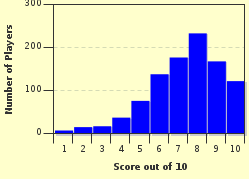Quiz Answer Key and Fun Facts
1. School-age children often have boundless energy. What else is accurate about them?
2. Girls between the ages of five and nine usually have drastic physical differences from boys of the same age.
3. School-age children come in a myriad of shapes and sizes. All of the following generally play a role in children's height and weight development EXCEPT:
4. School-age boys tend to be active, fun-loving, and competitive. What else is typically true about them?
5. Children learn in a variety of ways, called multiple intelligences. What is NOT a valid assessment about children's learning?
6. In middle childhood (five to twelve years), children undergo rapid psychosocial development. Their understanding of their own identities--and that of others--begins to expand. What is usually descriptive of children at this stage?
7. Friends and peer groups play a major part in school-age children's lives. Invariably, some children will be popular and others will not. Can adult caregivers do anything to impact a child's social situation?
8. Self-image is an important aspect of social development in school-age children. What is true about self-image?
9. Bullying is when one child intentionally intimidates or injures another child. What is NOT true about bullying?
10. Who ultimately has the greatest influence over a school-age child's emotional and social development?
Source: Author
pagiedamon
This quiz was reviewed by FunTrivia editor
Nannanut before going online.
Any errors found in FunTrivia content are routinely corrected through our feedback system.

